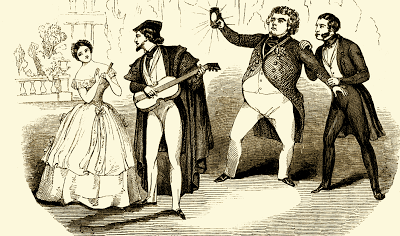by Paul J. Pelkonen

Norina, Ernesto, the Don and Dr. Malatesta in Act III of Don Pasquale.
Image from WikiMedia Commons.
Pasquale is part con game and part rough-and-tumble farce, with the old man (played here by the vigorous Korean bass-baritone Jeongcheol Cha) turning rapidly from suitor to victim as his new wife turns out to be a spendthrift and worse yet, a shrew. Mr. Cha (star of last year's Juilliard Don Giovanni) proved adept at both sides of the character, bumptious and unlikeable in the first two act and a rather pathetic figure once the tables are turned. He also proved adept at the role's low tessitura and difficult patter, spouting the rapid-fire parlando lines with ease.
Mr. Cha also proved an adept physical comedian. In the first act, he makes use of an onstage personal trainer to get pumped up for marriage, engaging in physical comedy with a jump rope, an iron barbell and even a medicine ball to get ready for his big night. When the wedding goes to hell, he incorporates a stooped posture, a walking stick and even a wheelchair to age and deteriorate before the eyes of the audience.
He was evenly matched by soprano Deanna Breiwick, who made the high-lying role of Norina into an enchanting farce. Blessed with film-star looks that were only helped by James Robinson's stylish art deco imagery, she turned the Don on his head while tossing off seemingly effortless high notes that exploded in the air of the Peter Jay Sharp Theater like fireworks. Ms. Breiwick was also expert in the comic scenes where as the Don's wife "Sofronia" she exuded cold-hearted greed in a red-hot dress.
Dr. Malatesta is the most complex character in the plot, the Figaro-like genius who drives the plot and shows the Don the error of his ways. Tobias Greenhalgh brought a Mephistophelean dimension to the medico, helped by unconventional lighting from the wings in his scenes with Pasquale. Mr. Greenhalgh also proved adept in the patter scenes, going toe-to-toe with Norina and the Don and always coming out on top.
The role of Ernesto is a proving ground for young singers, who get to show their stuff as the ardent, if helpless youth in the first act and the mature lover in the third. It was in that Act III aria "Com'è gentil", sung from offstage that tenor Javier Abreu proved himself, soaring to delicate heights and using all the resources of his instrument to project from the wings.
Mr. Robinson delivers a handsome, traditional production that forcibly updates the Don's antiques to the harsh chiaroscuro style of the swinging Sixties. Other interesting touches include two extras who might be out of The Talented Mr. Ripley and an onstage swimming pool in the garden scene. Stephen Lord led the orchestra in an incisive performance of this popular score, moving the affair forward briskly and giving the young singers time to add ornamentation and display their artistry to an appreciative audience.

